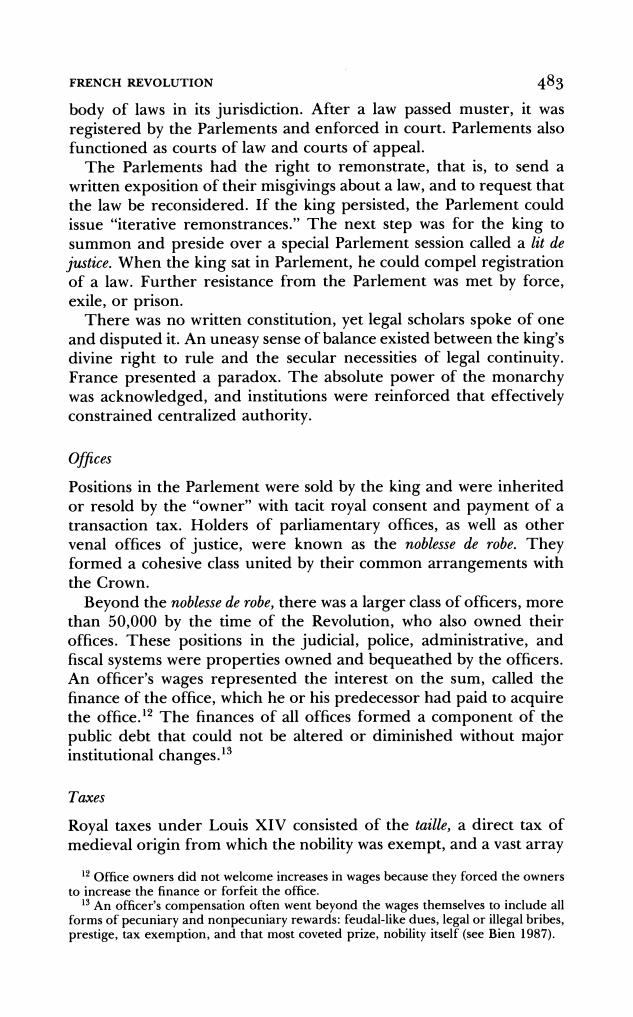正在加载图片...

FRENCH REVOLUTION 483 body of laws in its jurisdiction.After a law passed muster,it was registered by the Parlements and enforced in court.Parlements also functioned as courts of law and courts of appeal. The Parlements had the right to remonstrate,that is,to send a written exposition of their misgivings about a law,and to request that the law be reconsidered.If the king persisted,the Parlement could issue "iterative remonstrances."The next step was for the king to summon and preside over a special Parlement session called a lit de justice.When the king sat in Parlement,he could compel registration of a law.Further resistance from the Parlement was met by force, exile,or prison. There was no written constitution,yet legal scholars spoke of one and disputed it.An uneasy sense of balance existed between the king's divine right to rule and the secular necessities of legal continuity. France presented a paradox.The absolute power of the monarchy was acknowledged,and institutions were reinforced that effectively constrained centralized authority. Offices Positions in the Parlement were sold by the king and were inherited or resold by the "owner"with tacit royal consent and payment of a transaction tax.Holders of parliamentary offices,as well as other venal offices of justice,were known as the noblesse de robe.They formed a cohesive class united by their common arrangements with the Crown. Beyond the noblesse de robe,there was a larger class of officers,more than 50,000 by the time of the Revolution,who also owned their offices.These positions in the judicial,police,administrative,and fiscal systems were properties owned and bequeathed by the officers. An officer's wages represented the interest on the sum,called the finance of the office,which he or his predecessor had paid to acquire the office.12 The finances of all offices formed a component of the public debt that could not be altered or diminished without major institutional changes.3 Taxes Royal taxes under Louis XIV consisted of the taille,a direct tax of medieval origin from which the nobility was exempt,and a vast array 12 Office owners did not welcome increases in wages because they forced the owners to increase the finance or forfeit the office. 13 An officer's compensation often went beyond the wages themselves to include all forms of pecuniary and nonpecuniary rewards:feudal-like dues,legal or illegal bribes, prestige,tax exemption,and that most coveted prize,nobility itself(see Bien 1987).FRENCH REVOLUTION 483 body of laws in its jurisdiction. After a law passed muster, it was registered by the Parlements and enforced in court. Parlements also functioned as courts of law and courts of appeal. The Parlements had the right to remonstrate, that is, to send a written exposition of their misgivings about a law, and to request that the law be reconsidered. If the king persisted, the Parlement could issue "iterative remonstrances." The next step was for the king to summon and preside over a special Parlement session called a lit de justice. When the king sat in Parlement, he could compel registration of a law. Further resistance from the Parlement was met by force, exile, or prison. There was no written constitution, yet legal scholars spoke of one and disputed it. An uneasy sense of balance existed between the king's divine right to rule and the secular necessities of legal continuity. France presented a paradox. The absolute power of the monarchy was acknowledged, and institutions were reinforced that effectively constrained centralized authority. Offices Positions in the Parlement were sold by the king and were inherited or resold by the "owner" with tacit royal consent and payment of a transaction tax. Holders of parliamentary offices, as well as other venal offices of justice, were known as the noblesse de robe. They formed a cohesive class united by their common arrangements with the Crown. Beyond the noblesse de robe, there was a larger class of officers, more than 50,000 by the time of the Revolution, who also owned their offices. These positions in the judicial, police, administrative, and fiscal systems were properties owned and bequeathed by the officers. An officer's wages represented the interest on the sum, called the finance of the office, which he or his predecessor had paid to acquire the office.'2 The finances of all offices formed a component of the public debt that could not be altered or diminished without major institutional changes.'3 Taxes Royal taxes under Louis XIV consisted of the taille, a direct tax of medieval origin from which the nobility was exempt, and a vast array 12 Office owners did not welcome increases in wages because they forced the owners to increase the finance or forfeit the office. 13 An officer's compensation often went beyond the wages themselves to include all forms of pecuniary and nonpecuniary rewards: feudal-like dues, legal or illegal bribes, prestige, tax exemption, and that most coveted prize, nobility itself (see Bien 1987)